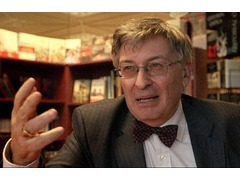Latin America and Asia
Documents from [1981] to [2002]Identity Statement
9 files
Carr, Mary
Content and Structure
As a Spaniard, Angel Viñas participated in a movement which the government of Madrid promoted which reflected its traditional interest in Latin America, within the European institutions. In such a context the idea was conceived that Spain could serve as a "promoter of links" between Europe and the Latin-American sub-continent. From January 1983 to March 1987, Angel Viñas assumed the functions of advisor to the two socialist ministers for Foreign Affairs, Fernando Morán and Francisco Ordoñez, writing notes on security problems and on the creation of an office for analysing and forecasting external policies which would be responsible for making contacts with those existing in London, Paris and Bonn. When the cabinet was realised, Ordoñez entrusted Angel Viñas the job divising ways and means for promoting relations between the Community and Latin America within the perspective of the first European Council at which Spain participated.
In April 1987, Claude Cheysson who was responsible for DG 1 (Commercial Policy and North-South Relations) named, on the recommendation of the Spanish government, Angel Viñas responsible for the relations of the Community with Latin America and Asia within the Directorate. His role consisted then in guiding Commission attention, which was traditionally and historically centred on Africa and the Mediterranean, in reinforcing commercial and political relations with the sub-continent. From the beginning of the 1980's, relations between the Community with the region was limited to bi-lateral commercial relations with individual countries such as Argentina, Uruguay, Brazil and Mexico and the extension to the sector of co-operation with non-associated developing countries was launched in 1984. The entry of Spain to the Community coincided with the Falklands war and the central American Nicaraguan Sandinista conflict, events which revealed the incoherencies and the faults in the Community's position with regard to Latin America, opening the way to change. On the 22 June 1987, on the recommendation of the Commission, the Council approved a strategic document which intensified the Community's relationship with Latin America: it recognised that this perspective should lead to a reinforcement of the presence of the Commission in the area, and an intensification of political dialogue, an increase in developmental aid in favour of deprived countries and the reinforcement of regional co-operation. At the end of 1987, Viñas participated at Commission/Rio Group meetings where the combination of peace, democracy and development was suggested as a solution to the central American conflict. Between 1988 and 1991, despite the reluctance shown by certain services in Brussels, who did not share the Commission's view that the Community's representation in South America should be expanded, several delegations were opened in Central America, and later at Montevideo, Buenos-Aires, Lima and Santiago after the political change in 1989. Viñas organised in this context a meeting between Cheysson and Spanish Prime Minister Gonzalez at Moncloa. With the second presidency of Delors, in January 1989, the Spaniard Abel Matutes took over from Cheysson. Viñas and his colleagues set about increasing the network of contacts with diplomats and latin-American entrepreneurs, elaborating detailed plans for the evolution of trade, and putting forward a strategy aiming at improving the aid mechanisms for development. In 1989 the agreements know as the "Third Generation" were signed between the Community, Argentina, Chile and later with Paraguay and Uruguay, countries which had suffered under military dictators. They founded their cooperative relationships based on respect for democratic principles and human rights. This was followed by actions supporting national legislation in the area of agricultural reform, regional development and the re-launch of commercial trade: the formation of industrial and trade union executives, modernisation of some ministerial and municipal services in Central America, assistance in the creation of micro-enterprises in urban centres, exemptions to the community preferences in favour of Andean countries such as Bolivia and Colombia who wished to put an end to the cocaine culture, support for the proposals extending the system of generalised preferences (SPG) to countries in central America within the framework of the Uruguay round (1986-1990), in opposition to France and the DG for Commercial Policy. The Council approved in December 1990 a financial packet without precedent, of 2.750 millions ecu to support its actions. Based on the proposition of the Italian Minister for Foreign Affairs, De Michelis, on the 20 December 1990, the first common declaration between the two continents was made in Rome: the Council could appeal to the European Investment Bank to realise its operations in Latin America and on institutional procedure to the institutionalisation of dialogue with the Rio Group and that of San José. In the regulation established for this end in 1992, it was stipulated that in the case of fundamental and persistent violations of human rights, aid could be suspended. The instruments for cooperation were equally based on the principles of protection for the environment, the good management of public affairs and the liberalisation of trade.
The restructuring of the DG, which followed the retirement of Director General Durieux saw the creation of a specific Direction for Latin America which Viñas occupied until he left the DG in November 1991.
